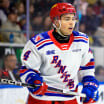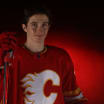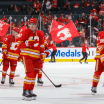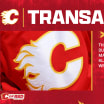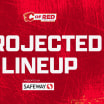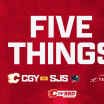The superlatives weren't, shall we say, varied.
When pressed to define to his boss, Bill Peters, in the aftermath of a turnaround season, these three words were uttered the most, often with a smile:
Strict.
Demanding.
Stern.
But all of it, as first-year assistant coach Ryan Huska established, "in a good way.
"A very, very good way."
'HE'LL PUSH YOU'
Huska discusses head coach Peters, lauds the disciplined, detailed approach he brought to the Flames
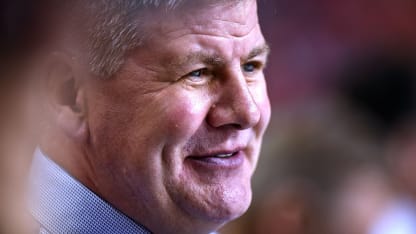
Peters took a Flames team that missed the playoffs a year prior to the second-best record in the league, a Pacific Division title, and 50 wins for only the second time in franchise history and the first in three decades.
"No small feat," Huska said. "Considering everything that I saw and was fortunate to be part of this year, he deserves a whole heap of credit for what happened with this team."
There's nothing Peters - the rugged Three Hills, Alta., product - hates more than talking about himself.
Others, meanwhile, are more than happy to lob acclaim.
Fact is, the Flames had the season they did because of the stunning, all-star performances of Johnny Gaudreau, Mark Giordano and others, but the work behind the bench cannot go unnoticed.
"I think he's got into their ear," said GM Brad Treliving. "They respect him. If they aren't going well or they're not playing a lot, he's great and up-front in telling them why and how they can be better. I think that honesty is a big piece of it. And he's a real smart hockey man, he gives them a plan to be successful.
"From Day 1, they bought into it."
>> RELATED: HUSKA THE DEFENCE WHISPERER
The Flames had what essentially boiled down to a brand-new staff, a swath of new players, no fewer than four rookies playing big minutes in key roles, and above all, the very best of intentions.
What the newfangled troupe then needed was an architect to piece it all together.
A no-bull leader with a clear, concise roadmap for how to squeeze the most from a group loaded with talent.
Take it from someone who lived it.
Someone from the outside, with no preconceived notions or past experiences of any kind to fall back on.
In Huska's mind, the scrupulous, hard-working environment popularized by the new head coach was exactly what the doctor ordered.
"We'd see each other at meetings in the summer and I would sometime run into him at the draft, coaches' conferences and things like that," said Huska, who led the WHL's Kelowna Rockets while Peters did the same with the Spokane Chiefs, in the early 2000's. "Other than that, no, we didn't have much of a relationship at all.
"It was new for me, really, not knowing a lot about him. All I really knew was the way his teams played, and what I was able to watch when he was in the NHL (with the Carolina Hurricanes).
"His team, in Spokane, in particular, was really detailed, really organized and really hard-working. My assumption coming in was that this team would be the same and I really wasn't all that far off."
"To me, one of the most important things Bill did was get the group together on Day 1 and discuss what happened last year.
"Just once.
"While many of us, including the coaches, were new and didn't experience what unfolded last year, it was just good opportunity to clear the air and say, 'Hey, guys, this is our group now. This is who we're going to be, and that is all that matters.'
"That the set the standard right off the hop."
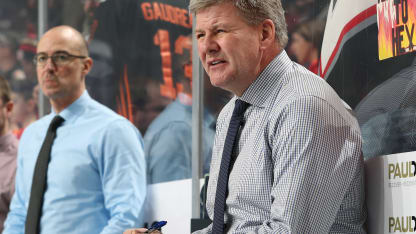
Huska lauds Peters' communication style - not only with the players, but the rest of the staff as well, saying the "directness" in his messaging allowed everyone to understand their roles, responsibilities, and to know exactly where they stand.
Do well? He'll tell you.
Screw up? You better believe he'll tell you that, too.
But no matter what the circumstance, good or bad, Peters had a way of turning those into teachable moments, to make his people the best version of themselves on a daily basis.
"Bill has a way of doing things that are very detailed, very organized, and he's to the point," he said. "Always.
"There's not a lot of fluff with Bill.
"Make no mistake - we had a lot of fun in the coaches' office here, and I think you need to have that over the course of the year. But at the same time, the expectations for the jobs we were to do, they were high. He set a standard for us in here and I think it was a real good thing. And with him, being as organized as he was, I think the team was organized as well.
"We knew what to expect, the players knew what to expect, and as a result, everyone came in here and went to work, every day."
It was that commitment that helped the Flames go from one of the leakiest teams defensively to one that averaged only 28.1 shots against per game this year - the lowest in the NHL.
A stat like that goes well beyond talent.
It's a buy-in, buoyed by guidance.
"That's what he does," Huska said. "Players love going to work for guys like that.
"He'll push you - and man, does he push you - but it's all because of you and the team. He cares deeply.
"He wants to know you on a personal level. What makes you tick. How the family's doing.
"To do that and push as hard as he does at the same time? That's authentic.
"And it's what great leaders do."






